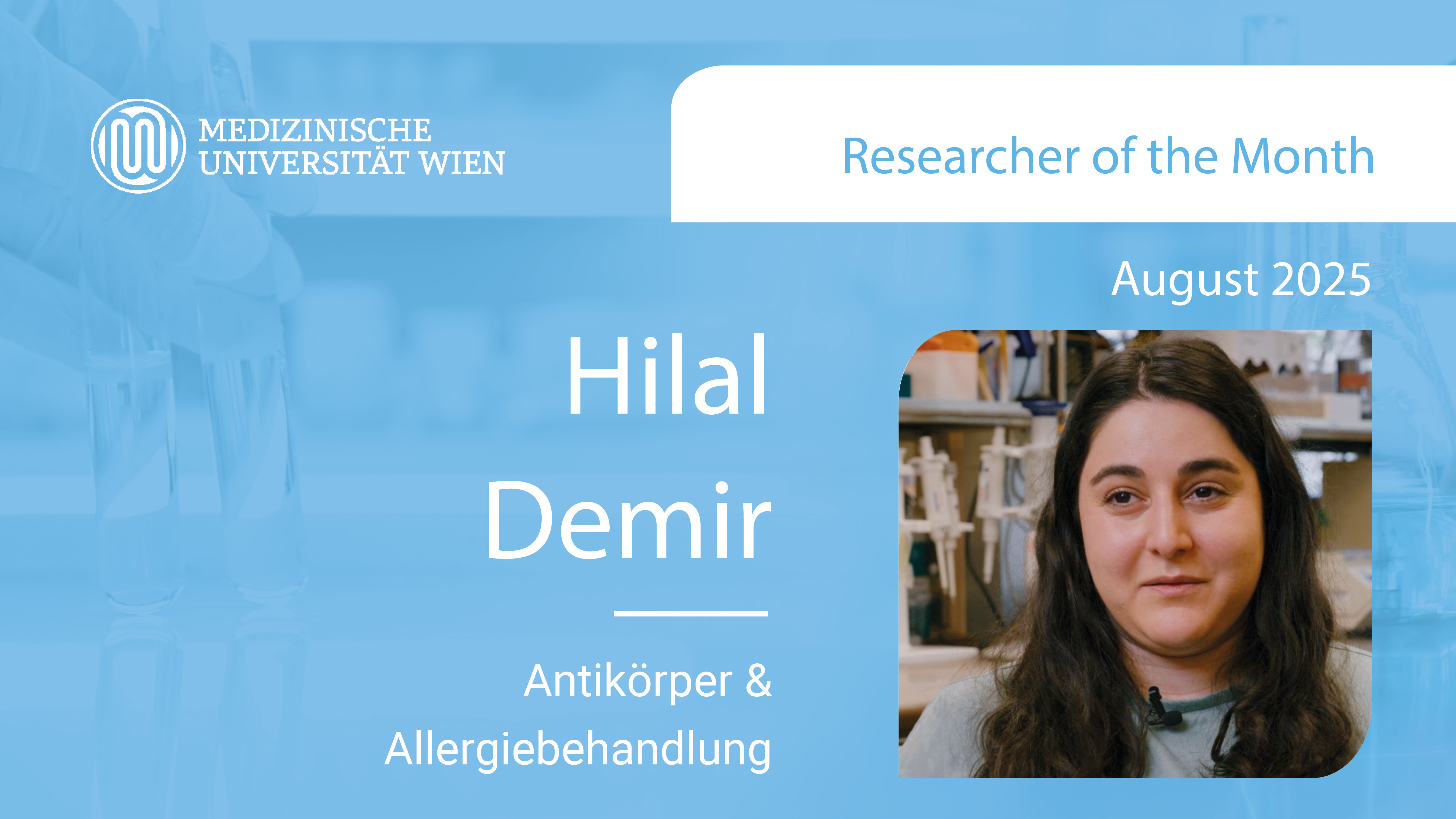
After activation, data will be sent to YouTube. Further information here: Data protection
English subtitles on Youtube available: click on the gear icon and select “Untertitel” – “English”
Hilal Demir, PhD

MedUni Wien RESEARCHER OF THE MONTH August 2025
IgE antibodies specific for the major birch pollen allergen, Bet v 1, that cross-react with the structurally related major apple allergen, Mal d 1, induce apple allergy in a high number of birch pollen-allergic individuals. The only causative treatment for birch pollen allergy is allergen immunotherapy with birch pollen allergen. This treatment effectively reduces birch pollinosis due to the induction of protective IgG antibodies. Interestingly, the treatment does often not improve birch pollen-related apple allergy. We hypothesized that the lack of therapeutic success could be due to a limited cross-reactivity of therapy-induced protective IgG antibodies. To address this, we compared IgG antibodies induced by immunotherapy with recombinant (r) Bet v 1 or rMal d 1 with regard to their protective function to the Bet v 1-related allergens Cor a 1.04 (hazelnut), Pru av 1 (cherry), and Dau c 1 (carrot). Our results suggest that administration of an allergen induces protective antibodies against a related allergen if they are >80% identical. Since Bet v 1 and Mal d 1 have only 68% surface identity this study may explain why treatment with birch pollen allergen may not always be successful to reduce apple allergy.
Selected Literature
-
Demir, H., et al., Cross-protection of AIT-induced antibodies to related allergens requires a high degree of structural identity. Allergy, 2024.
-
Biedermann, T., et al., Birch pollen allergy in Europe. Allergy, 2019. 74(7): p. 1237-1248.
-
Geroldinger-Simic, M., et al., Birch pollen-related food allergy: clinical aspects and the role of allergen-specific IgE and IgG4 antibodies. J Allergy Clin Immunol, 2011. 127(3): p. 616-22 e1.
-
Halken, S., et al., EAACI guidelines on allergen immunotherapy: Prevention of allergy. Pediatr Allergy Immunol, 2017. 28(8): p. 728-745.
-
Kallen, E.J.J., et al., The effect of subcutaneous and sublingual birch pollen immunotherapy on birch pollen-related food allergy: a systematic review. Front Allergy, 2024. 5: p. 1360073.
-
Kinaciyan, T., et al., Efficacy and safety of 4 months of sublingual immunotherapy with recombinant Mal d 1 and Bet v 1 in patients with birch pollen-related apple allergy. J Allergy Clin Immunol, 2018. 141(3): p. 1002-1008.
-
Sanchez Acosta, G., et al., IgE-blocking antibodies following SLIT with recombinant Mal d 1 accord with improved apple allergy. J Allergy Clin Immunol, 2020. 146(4): p. 894-900 e2.
-
Strobl, M.R., et al., Identification of apple cultivars hypoallergenic for birch pollen-allergic individuals by a multidisciplinary in vitro and in vivo approach. Clin Transl Allergy, 2022. 12(8): p. e12186.
-
Strobl, M.R., et al., The role of IgG(1) and IgG(4) as dominant IgE-blocking antibodies shifts during allergen immunotherapy. J Allergy Clin Immunol, 2023. 151(5): p. 1371-1378 e5.
-
Strobl, M.R., et al., Easy assessment of the avidity of polyclonal allergen-specific serum antibodies. Clin Exp Allergy, 2024. 54(4): p. 278-285.
-
Kraiem, A., et al., Reducing the solubility of the major birch pollen allergen Bet v 1 by particle-loading mitigates Th2 responses. Allergol Int, 2024.
-
Strobl, M.R., et al., Affinity matters for IgE-blocking activity of allergen-specific antibodies. Allergy, 2023. 78(9): p. 2543-2546.